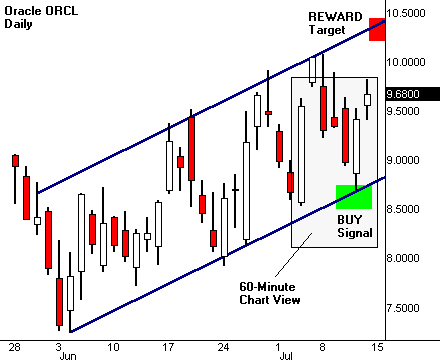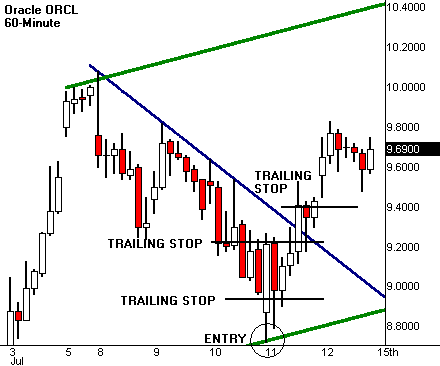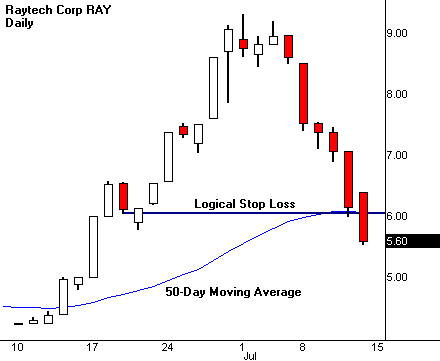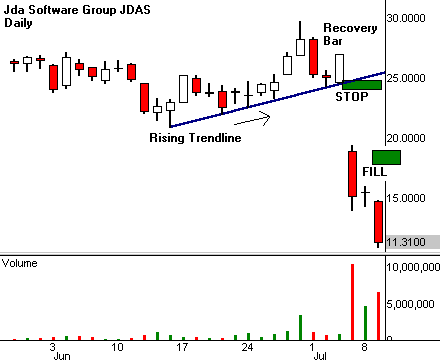Exit planning must deal with the good, the bad and the ugly. In other words, keep a profit protection strategy to exit winning trades, a stop loss strategy to get out of bad ones and a fire drill in case disaster strikes. You'll need all three tactics in every trade, because anything can happen once you hit the order button.
Your holding period guides the profit side of the exit equation. Always seek the reward target that matches your time in the market. In other words, trade the most profitable move from your entry to the target within the time frame that you're long or short the stock. This lets you apply both a time- and a price-based exit strategy to your winners.
A time-based exit strategy requires little interpretation. Focus on your holding period's time window rather than the price action. Exit the trade immediately when price hits the reward target at the right time. Exit the trade before price hits the reward target if the window starts to close. The trick with time-based strategies is to look for the best price available within the chosen window.
Most traders should start with a price-based exit strategy. For example, you enter a long position, and it moves into a profit. It rallies at a moderate pace and hits your reward target within the holding period. You exit the trade "blind" at the reward price. This means you take the money and go, without considering the current price action.


You've just taken a nice profit in a perfect world, but how do you protect yourself in the real one? Start by focusing on trends within shorter-term time frames. For example, when trading a daily chart, manage profit and loss using a 60-minute chart whenever possible. The shorter-term pattern will tell you when to move the stop in order to protect profits, or when to exit the trade entirely.
Let's outline common stages for a long position that eventually reaches the reward target:
- Price moves into a profit.
- Price reaches first resistance, and reverses.
- Price finds support and rallies through first resistance.
This action/reaction continues until price reaches the target. In this scenario, trade management requires a breakeven stop as soon as price moves into a profit. This stop should be moved up after the first reversal, but stay below short-term support. When price finally rallies above first resistance, move the stop just below this new level. Continue the process until the position hits the reward target.

Profits are nice, but many trades go haywire right away. The exit strategy is very simple in this situation: get out as soon as price breaks support on a long trade, or resistance on a short sale. This may sound simple, but there are two problems. First, many of us lack the discipline to take losses when they should be taken. Second, many of us don't understand how to place stop losses in the first place.
Take your loss when the market says you're wrong. Every setup has a trigger that violates the pattern you intend to trade. Identify this price in advance, and place your stop just behind it. Remember that this magic number changes dynamically with each new bar, so you need to adjust it often. But don't remove it under any circumstances.
Do you get frustrated because your stops get hit frequently on good trades? The fault lies in your analysis and trade management, not in the stops themselves. Many traders believe they can improve their performance by placing stops where they shouldn't go. Every stock will violate support/resistance up to a point before reversing. Your analysis must consider the stock's underlying volatility, so the stop can be placed outside this "market noise."
 Finally, you need a way to deal with unexpected bad news. Start with a panic drill, and practice it over and over again in your head. The exit strategy is simple: If you can beat the rest of the crowd out of the door, act immediately. The after-hours market can save you a fortune if you learn to use it wisely. If you can't escape right away, watch price action closely and take your best shot. The market can do anything it wants once bad news hits, and you may need to accept a large loss.
Finally, you need a way to deal with unexpected bad news. Start with a panic drill, and practice it over and over again in your head. The exit strategy is simple: If you can beat the rest of the crowd out of the door, act immediately. The after-hours market can save you a fortune if you learn to use it wisely. If you can't escape right away, watch price action closely and take your best shot. The market can do anything it wants once bad news hits, and you may need to accept a large loss.Sudden losses are a cost of doing business as a trader. Full disclosure rules and external events will impact your bottom line from time to time. Reduce your risk by choosing lower-volatility stocks to carry over longer time periods. Avoid holding anything through earnings reports or terrorist threats. Remember, it's not hard to rebuild profits after the unexpected takes a bite out of your bottom line.


6 comments:
Nice dude...
borneomoneymaker.com
A set of analyses that a forex trader uses to determine whether to buy or sell a currency pair at any given time. Forex signal systems could be based on technical analysis charting tools or news-based events. The day trader's currency trading system is usually made up of a multitude of signals that work together to create a buy or sell decision. Forex trading signals are available for free, for a fee or are developed by the traders themselves.
www.forexbusinesshelp.com
http://www.topforexsitereviews.com
http://www.topforexmarketplace.com
http://www.weblogohouse.com
hi nice blog. i like
Great blog! Very useful information :) thanks.
What is margin?
What is Forex?
Nice Blog,
Timing for exit market is the great article.
i like trading especially at the news are release. for trader who like trade with news, I recommend trading in armada markets. armada markets provide excellent service in the execution speed and the small spread compared to other brokers
The other you will be get 15 Euro Free
Post a Comment